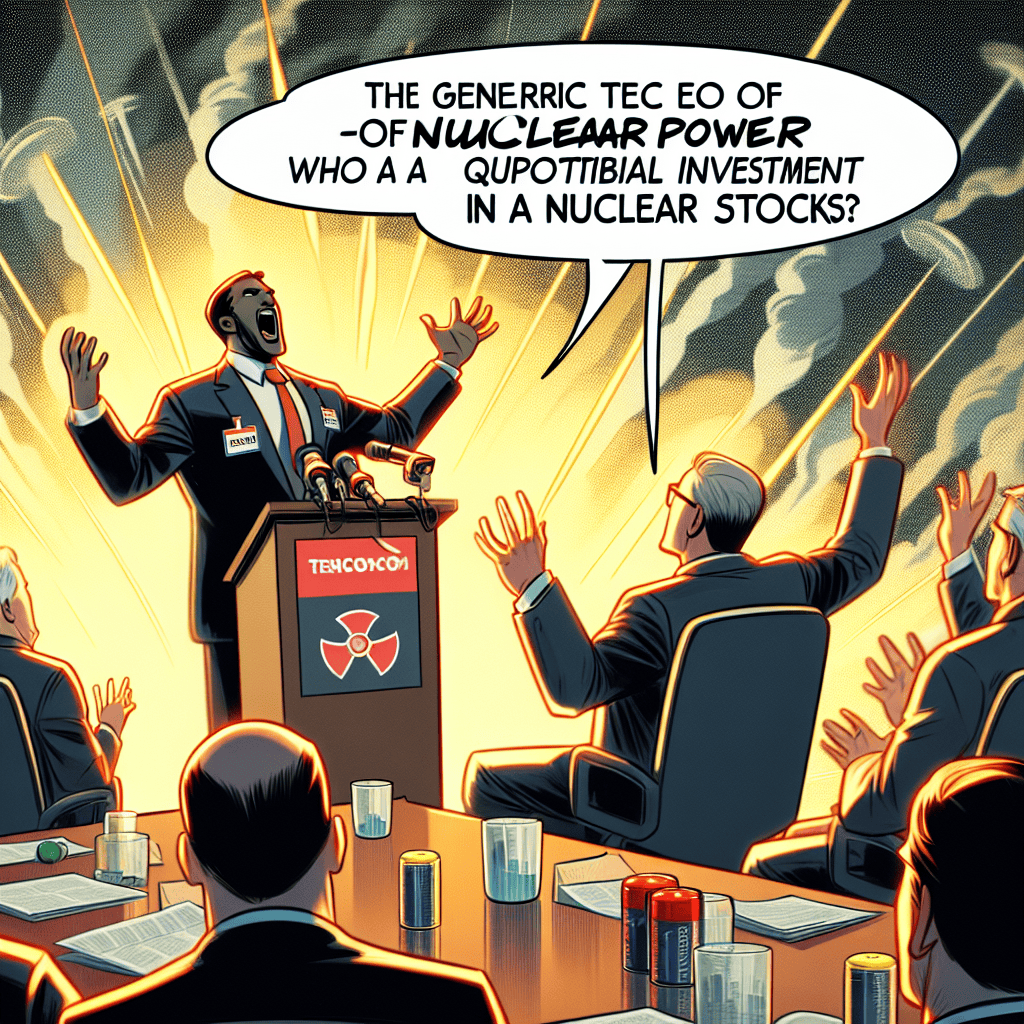“Jensen Huang Powers Up: Nvidia’s CEO Eyes Nuclear Energy for a Sustainable Future.”
Introduction
Nvidia CEO Jensen Huang has recently emerged as a vocal advocate for nuclear power, highlighting its potential as a sustainable and reliable energy source in the face of growing global energy demands and climate change concerns. Huang’s endorsement of nuclear energy underscores the technology’s capacity to provide a stable, low-carbon power supply, which is crucial for powering the data centers and advanced computing systems that drive Nvidia’s innovations. This advocacy has sparked interest among investors, prompting speculation about potential investment opportunities in nuclear stocks. As the world increasingly seeks clean energy solutions, Huang’s support for nuclear power could influence market dynamics and investment strategies, positioning nuclear energy as a pivotal component of the future energy landscape.
The Role of Nvidia in the Energy Sector: Jensen Huang’s Vision for Nuclear Power
Nvidia CEO Jensen Huang has recently emerged as a vocal advocate for nuclear power, a stance that has sparked considerable interest and speculation within both the technology and energy sectors. As the leader of a company renowned for its cutting-edge advancements in graphics processing units (GPUs) and artificial intelligence (AI), Huang’s endorsement of nuclear energy is noteworthy, suggesting a potential shift in how technology leaders view the future of energy. This development raises intriguing questions about the role Nvidia might play in the energy sector and whether this could signal a broader trend of tech companies investing in nuclear power.
Huang’s advocacy for nuclear energy is rooted in the pressing need for sustainable and reliable energy sources. As the world grapples with the dual challenges of climate change and increasing energy demands, nuclear power presents a viable solution due to its ability to generate large amounts of electricity with minimal carbon emissions. Unlike fossil fuels, nuclear energy offers a cleaner alternative that can help mitigate the environmental impact of energy production. Huang’s support for this energy source aligns with a growing recognition of the need to diversify energy portfolios to include more sustainable options.
Moreover, Huang’s interest in nuclear power is not merely theoretical. Nvidia’s technological prowess, particularly in AI and high-performance computing, could play a pivotal role in advancing nuclear energy technologies. For instance, AI can optimize nuclear reactor operations, enhance safety protocols, and improve efficiency, making nuclear power more viable and attractive. By leveraging its expertise, Nvidia could contribute to innovations that address some of the longstanding challenges associated with nuclear energy, such as waste management and safety concerns.
The potential for Nvidia to invest in nuclear stocks is a topic of considerable speculation. While no official announcements have been made, Huang’s public statements suggest that he sees significant potential in the nuclear sector. An investment by Nvidia in nuclear energy could catalyze further interest from other technology companies, potentially leading to increased funding and innovation in the field. This could, in turn, accelerate the development of next-generation nuclear technologies, such as small modular reactors (SMRs) and advanced fusion reactors, which promise to be safer and more efficient than traditional nuclear power plants.
Furthermore, Huang’s advocacy for nuclear power reflects a broader trend of technology leaders recognizing the importance of sustainable energy solutions. As companies like Nvidia continue to push the boundaries of what is technologically possible, their involvement in the energy sector could drive significant advancements. This intersection of technology and energy holds the promise of transformative changes that could redefine how energy is produced and consumed globally.
In conclusion, Jensen Huang’s endorsement of nuclear power underscores the potential for technology companies to play a crucial role in shaping the future of energy. While it remains to be seen whether Nvidia will make direct investments in nuclear stocks, Huang’s vision highlights the importance of integrating sustainable energy solutions with technological innovation. As the world continues to seek ways to address climate change and energy demands, the collaboration between tech giants and the energy sector could prove to be a pivotal factor in achieving a more sustainable future.
How Jensen Huang’s Advocacy Could Influence Nuclear Stock Markets
Nvidia CEO Jensen Huang has recently emerged as a vocal advocate for nuclear power, a stance that could have significant implications for the nuclear stock markets. As the leader of a company at the forefront of technological innovation, Huang’s endorsement of nuclear energy is noteworthy and may influence investor sentiment and market dynamics. His advocacy is rooted in the belief that nuclear power is a critical component in addressing the global energy crisis and combating climate change. By emphasizing the potential of nuclear energy to provide a stable and low-carbon power source, Huang is aligning with a growing consensus that sees nuclear power as an essential part of the future energy mix.
The impact of Huang’s advocacy on nuclear stocks could be substantial. As a highly respected figure in the tech industry, his opinions carry weight with investors who are keenly attuned to emerging trends and technologies. Huang’s support for nuclear energy may prompt investors to reevaluate the potential of nuclear stocks, which have often been overshadowed by the rapid growth of renewable energy sectors such as solar and wind. This renewed interest could lead to increased investment in nuclear companies, driving up stock prices and encouraging further innovation and development within the industry.
Moreover, Huang’s endorsement comes at a time when the nuclear industry is experiencing a resurgence of interest. Governments around the world are reconsidering their energy policies in light of the urgent need to reduce carbon emissions and ensure energy security. In this context, nuclear power is gaining traction as a reliable and scalable solution. Huang’s advocacy could serve as a catalyst for this shift, encouraging policymakers and investors alike to take a closer look at the potential benefits of nuclear energy.
In addition to influencing investor sentiment, Huang’s support for nuclear power may also spur technological advancements within the industry. Nvidia, known for its cutting-edge graphics processing units (GPUs) and artificial intelligence (AI) capabilities, could play a pivotal role in enhancing the efficiency and safety of nuclear power plants. By leveraging AI and machine learning, Nvidia could help optimize reactor operations, improve predictive maintenance, and enhance safety protocols. This technological synergy could further bolster the attractiveness of nuclear stocks, as investors recognize the potential for innovation-driven growth.
Furthermore, Huang’s advocacy highlights the interconnectedness of the tech and energy sectors. As the world becomes increasingly digitalized, the demand for energy is set to rise, necessitating sustainable and reliable power sources. Nuclear energy, with its ability to provide consistent baseload power, complements the intermittent nature of renewable sources and supports the growing energy needs of the digital economy. Huang’s vision underscores the importance of a diversified energy portfolio that includes nuclear power as a cornerstone.
In conclusion, Jensen Huang’s advocacy for nuclear power has the potential to significantly influence nuclear stock markets. By drawing attention to the benefits of nuclear energy and its role in addressing global energy challenges, Huang is likely to inspire increased investment and innovation within the industry. As investors and policymakers respond to this renewed focus on nuclear power, the sector may experience a revitalization that positions it as a key player in the transition to a sustainable energy future. Consequently, those considering investment in nuclear stocks may find themselves at the forefront of a promising and transformative market opportunity.
Nvidia’s Strategic Shift: Exploring the Potential of Nuclear Energy Investments
Nvidia CEO Jensen Huang has recently made headlines by advocating for nuclear power, a move that has sparked discussions about the potential for investment in nuclear stocks. This strategic shift in focus comes at a time when the global energy landscape is undergoing significant transformations, driven by the urgent need to address climate change and transition to sustainable energy sources. As Nvidia continues to lead in the technology sector, Huang’s endorsement of nuclear energy could signal a broader trend of tech companies exploring investments in alternative energy solutions.
Nuclear power, long considered a controversial energy source due to safety concerns and waste management issues, is gaining renewed attention as a viable option for reducing carbon emissions. Unlike fossil fuels, nuclear energy produces minimal greenhouse gases, making it an attractive option for countries striving to meet their climate goals. Furthermore, advancements in nuclear technology, such as small modular reactors (SMRs) and next-generation reactors, promise enhanced safety and efficiency, potentially addressing some of the longstanding criticisms of nuclear power.
Jensen Huang’s advocacy for nuclear energy aligns with Nvidia’s broader commitment to sustainability and innovation. As a leader in the development of graphics processing units (GPUs) and artificial intelligence (AI), Nvidia has consistently pushed the boundaries of technology to drive progress across various industries. By exploring nuclear energy investments, Nvidia could leverage its technological expertise to support the development of safer and more efficient nuclear power solutions. This move could also position the company as a pioneer in the integration of cutting-edge technology with sustainable energy practices.
The potential for Nvidia to invest in nuclear stocks raises intriguing possibilities for the energy and technology sectors. If Nvidia were to channel resources into nuclear energy, it could catalyze further interest and investment from other tech giants, thereby accelerating the development and deployment of advanced nuclear technologies. This influx of capital and innovation could help overcome some of the financial and technical barriers that have historically hindered the growth of the nuclear industry.
Moreover, Nvidia’s potential investment in nuclear energy could have significant implications for the stock market. As investors increasingly prioritize environmental, social, and governance (ESG) criteria, companies that demonstrate a commitment to sustainable practices are likely to attract more attention and capital. By aligning itself with the nuclear energy sector, Nvidia could enhance its ESG profile, potentially boosting its stock value and appealing to a broader range of investors.
However, it is important to consider the challenges and risks associated with nuclear energy investments. Despite technological advancements, public perception of nuclear power remains mixed, with concerns about safety and waste disposal persisting. Additionally, regulatory hurdles and high initial costs could pose significant obstacles to the widespread adoption of nuclear energy. Therefore, any potential investment by Nvidia in this sector would require careful consideration and strategic planning to navigate these complexities.
In conclusion, Jensen Huang’s advocacy for nuclear power represents a noteworthy development in the intersection of technology and energy. As Nvidia explores the potential of nuclear energy investments, it could pave the way for a new era of collaboration between tech companies and the energy sector. While challenges remain, the integration of advanced technology with nuclear power holds the promise of a more sustainable and efficient energy future. As such, investors and industry stakeholders will be closely monitoring Nvidia’s next moves, eager to see how this strategic shift unfolds and what it might mean for the future of energy and technology.
The Future of Energy: Jensen Huang’s Case for Nuclear Power

In recent years, the global energy landscape has been undergoing a significant transformation, driven by the urgent need to address climate change and reduce carbon emissions. Amidst this backdrop, Jensen Huang, the CEO of Nvidia, has emerged as a vocal advocate for nuclear power, positioning it as a crucial component of the future energy mix. Huang’s endorsement of nuclear energy is not only noteworthy due to his influential position in the tech industry but also because it signals a potential shift in how technology leaders view sustainable energy solutions.
Nuclear power, long a subject of debate, is gaining renewed attention as countries seek reliable and low-carbon energy sources. Huang argues that nuclear energy offers a viable solution to the dual challenges of meeting growing energy demands and achieving carbon neutrality. Unlike fossil fuels, nuclear power plants produce electricity with minimal greenhouse gas emissions, making them an attractive option for reducing the carbon footprint of energy production. Furthermore, nuclear energy provides a stable and continuous power supply, unlike some renewable sources that are dependent on weather conditions.
Huang’s advocacy for nuclear power is rooted in the belief that technological advancements can address many of the historical concerns associated with nuclear energy, such as safety and waste management. Innovations in reactor design, including small modular reactors (SMRs) and advanced nuclear technologies, promise to enhance the safety and efficiency of nuclear power plants. These advancements could potentially mitigate the risks of accidents and reduce the volume and longevity of nuclear waste, addressing two of the most significant barriers to widespread nuclear adoption.
The potential for investment in nuclear stocks is an intriguing aspect of Huang’s endorsement. As the world increasingly prioritizes sustainable energy, companies involved in nuclear technology and infrastructure may experience heightened interest from investors. The development and deployment of next-generation nuclear reactors could open new markets and revenue streams, making nuclear stocks an attractive option for those looking to invest in the future of energy. However, it is essential for investors to conduct thorough research and consider the regulatory and political landscapes, as these factors can significantly impact the growth and viability of nuclear energy projects.
Moreover, Huang’s support for nuclear power aligns with a broader trend of tech leaders engaging with energy policy and sustainability issues. As technology companies continue to expand their influence and resources, their involvement in energy discussions could accelerate the adoption of innovative solutions and drive policy changes. By advocating for nuclear power, Huang is not only highlighting its potential benefits but also encouraging a dialogue on how technology and energy sectors can collaborate to achieve a sustainable future.
In conclusion, Jensen Huang’s advocacy for nuclear power underscores the growing recognition of its role in the future energy landscape. As technological advancements address historical challenges, nuclear energy presents a compelling option for reducing carbon emissions and ensuring a stable power supply. The potential for investment in nuclear stocks further highlights the economic opportunities associated with this energy source. As the world continues to grapple with the complexities of climate change and energy demand, the perspectives of influential leaders like Huang will be instrumental in shaping the path forward.
Analyzing the Impact of Nvidia’s CEO on Nuclear Energy Policies
Nvidia CEO Jensen Huang has recently emerged as a vocal advocate for nuclear power, a stance that has sparked considerable interest and speculation within both the technology and energy sectors. As the leader of a company at the forefront of artificial intelligence and high-performance computing, Huang’s endorsement of nuclear energy is seen as a significant development, potentially influencing public perception and policy direction. This advocacy comes at a time when the global community is grappling with the dual challenges of meeting increasing energy demands and reducing carbon emissions. Nuclear power, with its capacity to generate large amounts of electricity without direct carbon emissions, presents a compelling solution to these challenges.
Huang’s support for nuclear energy is rooted in the belief that it is a necessary component of a sustainable energy future. He argues that while renewable sources like wind and solar are crucial, they alone may not be sufficient to meet the world’s growing energy needs. Nuclear power, with its ability to provide a stable and continuous energy supply, could complement these renewable sources, ensuring a reliable energy grid. This perspective aligns with a broader movement among tech leaders who are increasingly recognizing the importance of sustainable energy solutions in mitigating climate change.
The potential impact of Huang’s advocacy on nuclear energy policies cannot be understated. As a highly influential figure in the tech industry, his opinions carry weight and could sway both public opinion and policy decisions. His endorsement may encourage other tech leaders to voice their support for nuclear energy, creating a ripple effect that could lead to increased investment and innovation in the sector. Moreover, Huang’s position could influence policymakers to reconsider nuclear energy’s role in national and international energy strategies, potentially leading to more favorable regulatory environments for nuclear power development.
In light of Huang’s advocacy, there is growing speculation about the potential for increased investment in nuclear stocks. Investors are keenly aware that shifts in public policy and perception can significantly impact market dynamics. If Huang’s support contributes to a more positive outlook for nuclear energy, it could lead to increased investor confidence and a subsequent rise in the value of nuclear-related stocks. This potential for financial growth may attract both individual and institutional investors looking to capitalize on the evolving energy landscape.
However, it is important to consider the challenges that nuclear energy faces, despite its potential benefits. Public concerns about safety, waste management, and the high costs associated with nuclear power plants remain significant hurdles. Addressing these issues will be crucial for gaining broader acceptance and support for nuclear energy. Huang’s advocacy could play a role in fostering dialogue and innovation aimed at overcoming these challenges, potentially leading to advancements in nuclear technology and safety measures.
In conclusion, Jensen Huang’s advocacy for nuclear power represents a noteworthy development in the discourse surrounding sustainable energy solutions. His influence as Nvidia’s CEO could have far-reaching implications for nuclear energy policies and investment trends. As the world continues to seek effective strategies for addressing climate change and energy demands, the intersection of technology leadership and energy policy will be an area to watch closely. Whether Huang’s support will translate into tangible changes in the nuclear energy sector remains to be seen, but it undoubtedly adds a significant voice to the ongoing conversation about our energy future.
Investment Opportunities: Nuclear Stocks in the Wake of Jensen Huang’s Endorsement
In recent years, the global energy landscape has been undergoing a significant transformation, driven by the urgent need to address climate change and reduce carbon emissions. Amidst this backdrop, nuclear power has re-emerged as a viable and sustainable energy source, garnering attention from various sectors, including technology. Notably, Jensen Huang, the CEO of Nvidia, has publicly advocated for nuclear power, highlighting its potential to play a crucial role in the transition to cleaner energy. This endorsement has sparked interest among investors, prompting them to consider the potential of nuclear stocks as a promising investment opportunity.
Jensen Huang’s support for nuclear energy is rooted in its ability to provide a stable and reliable power supply while minimizing environmental impact. Unlike fossil fuels, nuclear power generates electricity without emitting greenhouse gases during operation, making it an attractive option for reducing the carbon footprint of energy production. Furthermore, advancements in nuclear technology, such as small modular reactors (SMRs) and next-generation reactors, promise enhanced safety and efficiency, addressing some of the longstanding concerns associated with traditional nuclear power plants.
The endorsement from a prominent figure like Huang, who leads a company at the forefront of technological innovation, underscores the growing recognition of nuclear power’s potential. Nvidia, known for its cutting-edge developments in artificial intelligence and graphics processing, relies heavily on energy-intensive data centers. As such, Huang’s advocacy for nuclear energy aligns with the broader tech industry’s pursuit of sustainable and reliable energy sources to support its operations.
In light of Huang’s endorsement, investors are increasingly exploring the potential of nuclear stocks as a strategic addition to their portfolios. The nuclear sector, which has historically faced challenges related to public perception and regulatory hurdles, is now witnessing a resurgence of interest. Companies involved in the development and deployment of advanced nuclear technologies are particularly well-positioned to benefit from this renewed focus. As governments worldwide set ambitious targets for carbon neutrality, the demand for clean energy solutions is expected to rise, creating a favorable environment for nuclear energy investments.
Moreover, the geopolitical landscape further accentuates the appeal of nuclear power. With energy security becoming a paramount concern, countries are seeking to diversify their energy sources and reduce dependence on fossil fuel imports. Nuclear power, with its ability to provide a consistent and large-scale energy supply, offers a strategic advantage in achieving energy independence. This geopolitical dimension adds another layer of attractiveness to nuclear stocks, as nations prioritize investments in domestic energy infrastructure.
However, potential investors should approach the nuclear sector with careful consideration. While the prospects are promising, the industry is not without its challenges. Regulatory complexities, high initial capital costs, and public opposition remain significant hurdles that companies must navigate. Therefore, conducting thorough due diligence and assessing the risk-reward profile of individual stocks is essential for making informed investment decisions.
In conclusion, Jensen Huang’s endorsement of nuclear power has brought renewed attention to the sector, highlighting its potential as a key player in the global energy transition. As the world seeks sustainable and reliable energy solutions, nuclear power stands out as a compelling option. For investors, this presents an opportunity to explore nuclear stocks as part of a diversified investment strategy. By carefully evaluating the evolving landscape and considering the long-term potential of nuclear energy, investors can position themselves to capitalize on this emerging trend in the pursuit of sustainable returns.
The Intersection of Technology and Energy: Nvidia’s Nuclear Power Ambitions
In recent years, the intersection of technology and energy has become a focal point for discussions on sustainable development and innovation. Nvidia CEO Jensen Huang, a prominent figure in the tech industry, has recently turned his attention to nuclear power, advocating for its potential as a sustainable energy source. This shift in focus raises intriguing questions about the future of energy investments, particularly in nuclear stocks, and highlights the evolving relationship between technology leaders and energy solutions.
Jensen Huang’s advocacy for nuclear power is rooted in the pressing need for clean and reliable energy sources. As the world grapples with the challenges of climate change and the transition away from fossil fuels, nuclear energy presents a compelling alternative. Unlike solar and wind, which are intermittent by nature, nuclear power offers a consistent and substantial energy output. This reliability is crucial for powering the data centers and high-performance computing systems that companies like Nvidia rely on. By supporting nuclear energy, Huang underscores the importance of a stable energy supply in driving technological advancements.
Moreover, Huang’s interest in nuclear power aligns with a broader trend among tech leaders who are increasingly recognizing the role of energy in their operations. As companies strive to reduce their carbon footprints, the integration of clean energy sources becomes imperative. Nuclear power, with its low greenhouse gas emissions, offers a viable path toward achieving these sustainability goals. This alignment of interests between technology and energy sectors could potentially lead to increased investments in nuclear technology, as companies seek to secure their energy needs while adhering to environmental commitments.
The potential for investment in nuclear stocks is further bolstered by recent advancements in nuclear technology. Innovations such as small modular reactors (SMRs) promise to make nuclear power more accessible and cost-effective. These reactors are designed to be safer and more flexible than traditional nuclear plants, making them an attractive option for both developed and developing countries. As these technologies gain traction, they could attract significant investment from tech companies looking to diversify their energy portfolios and capitalize on the growing demand for clean energy solutions.
However, the path to widespread adoption of nuclear power is not without challenges. Public perception of nuclear energy remains a significant hurdle, with concerns about safety and waste management persisting. To address these issues, proponents of nuclear power, including Huang, emphasize the importance of transparent communication and robust regulatory frameworks. By fostering public trust and ensuring stringent safety standards, the nuclear industry can work towards overcoming these barriers and gaining broader acceptance.
In conclusion, Jensen Huang’s advocacy for nuclear power highlights the evolving relationship between technology and energy sectors. As tech leaders increasingly recognize the importance of sustainable energy solutions, nuclear power emerges as a promising option. The potential for investment in nuclear stocks is underscored by advancements in nuclear technology and the growing demand for clean energy. However, addressing public concerns and ensuring safety will be crucial in realizing the full potential of nuclear power. As the dialogue between technology and energy continues to evolve, the role of nuclear power in shaping a sustainable future remains a topic of significant interest and potential.
Q&A
1. **Who is Jensen Huang?**
Jensen Huang is the CEO and co-founder of Nvidia, a leading technology company known for its graphics processing units (GPUs) and AI innovations.
2. **What is Jensen Huang’s stance on nuclear power?**
Jensen Huang advocates for nuclear power as a clean and efficient energy source that can support the growing energy demands of technology and AI advancements.
3. **Why does Jensen Huang support nuclear power?**
Huang supports nuclear power because it provides a stable and low-carbon energy source, which is crucial for powering data centers and AI technologies sustainably.
4. **How might Huang’s advocacy impact Nvidia’s business strategy?**
While not directly related to Nvidia’s core business, Huang’s advocacy could influence Nvidia’s sustainability initiatives and partnerships with energy providers.
5. **What are potential benefits of investing in nuclear stocks?**
Investing in nuclear stocks could offer benefits such as exposure to a stable energy sector, potential growth from increased demand for clean energy, and alignment with global decarbonization goals.
6. **What are the risks associated with investing in nuclear stocks?**
Risks include regulatory challenges, high capital costs, public perception issues, and the long timeline for nuclear projects to become operational.
7. **Could Nvidia potentially invest in nuclear energy?**
While Nvidia’s primary focus is on technology and AI, the company could explore partnerships or investments in nuclear energy to support its sustainability goals and energy needs.
Conclusion
Nvidia CEO Jensen Huang’s advocacy for nuclear power highlights the growing recognition of nuclear energy as a viable solution for sustainable and reliable energy production, especially in the context of increasing energy demands and the need to reduce carbon emissions. His support could signal a potential shift in investor sentiment towards nuclear energy, as influential tech leaders often shape market trends and public perception. This advocacy might lead to increased interest and potential investment in nuclear stocks, as investors look to capitalize on the anticipated growth and innovation within the nuclear sector. However, potential investors should consider the regulatory, environmental, and technological challenges that the nuclear industry faces. Overall, Huang’s endorsement could serve as a catalyst for renewed focus and investment in nuclear energy, aligning with broader trends towards clean energy solutions.





